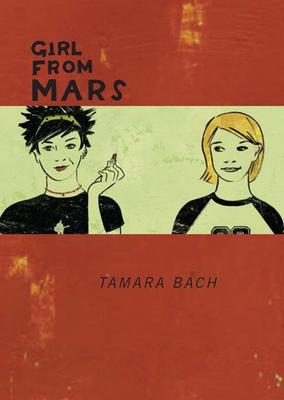
Miriam is a 15-year-old girl living in a small town in Germany, and like a lot of 15-year-old girls in small towns, she spends her life waiting for something to happen. She fights with her mom; passes her schooldays in boredom. She goes to parties and drinks when she has the opportunity yet never really enjoys herself. She has friends but when she thinks about it, doesn’t even know if she really likes them. As she describes it::
“I’m Miriam, I’m tired, and that’s it. No more, no less. Ordinary. My mother says I’m lazy. My math teacher says I’m not stupid. Sometimes I’m like this and sometimes I’m like that.”
And then, unexpectedly, there’s something interesting, and that something is Laura. And who is Laura? Miriam doesn’t quite know herself. And she doesn’t know exactly how she feels about Laura, either, other than she likes being with her, and that life is weird.
“Then I look at her and she looks at me, and it’s different again. Not bad different, but weird, like when you hear a new song that sounds strange but not in a bad way. And at some point you find yourself humming along, and you remember the words as you lie in bed, thinking of Laura and smiling into the dark, because the song is good, better than the others, and because it makes your heart beat faster, and it reminds you of yourself.”
Sorry to include so many quotes from Girl From Mars within the first two paragraphs of this review, but Tamara Bach just says it so well. Originally published in Germany in 2003 and first translated into English in 2008 by the Canadian publisher Groundwood Books, Girl From Mars won a number of German book awards such as the Oldenburg Young Adult Book Award and the Deutsche Jugendliteraturpreis (German Youth Literature Prize). As I read it, I kept getting hit with Skins or Show Me Love vibes, and thinking to myself, is it just me, or does Europe really just get teens right? There’s a certain darkness, a complexity, that permeates the language that, speaking as an American, isn’t always allowed here. It hits a tone that almost makes you uneasy, a dangerous feeling to many people who believe we need to look out for the delicate flowers of youth.
Or perhaps Miriam’s malaise strikes all the right chords for me because I relate to it too well. Oh, the ache of growing up in a small town when all of your insides feel so much bigger than your surroundings! Yet there are things that you like, the pretty things about your environment that you allow yourself to appreciate once in a while. But then you remember that everyone you know has known you since you were in diapers, and maybe you don’t want to be that person anymore. Maybe you want to be someone new. Maybe you want to make out with a girl named Laura.
As soon as I saw the cover of this book, I knew I would like it–the plain girl on the right who fears she’s boring, glancing at the girl on the left with the crazy hair and the confident smirk, wanting all that she is. Miriam’s heart is my heart.
This is a quick read and a relatively simple story plotwise, yet the conclusion is a bittersweet one. It’s one with no clean conclusions, proving that first loves can be just as confounding as later loves, if not more, and that for better or worse, sometimes the people we love are the same people we will never be able to truly know.
